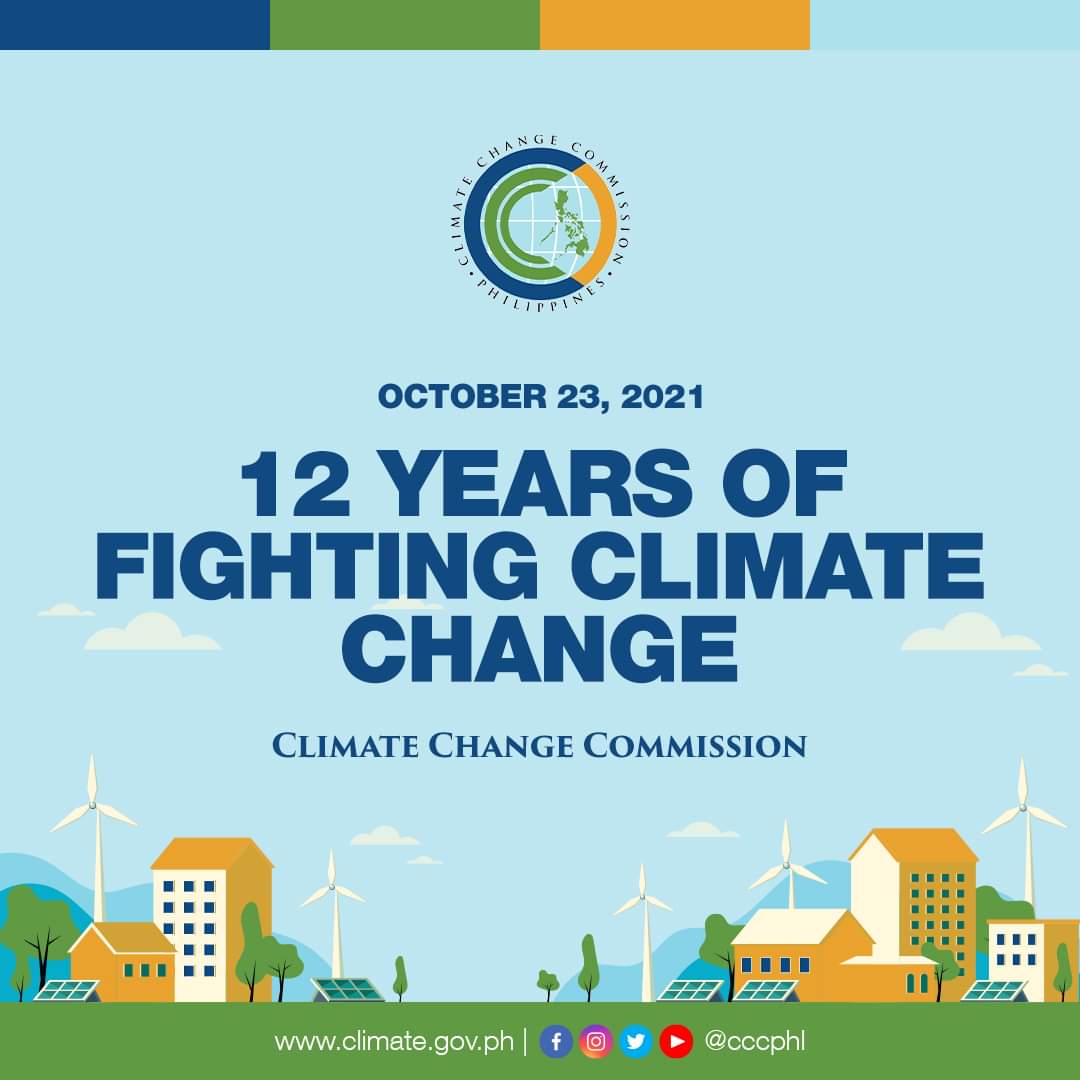
October 21, 2021 Thursday

MANILA, 22 October 2021 — The Climate Change Commission (CCC) continues its comprehensive efforts to adapt to a new normal and strengthens climate resilience as it celebrates its 12th year in service tomorrow.
The Commission was formed under Republic Act 9729 or the Climate Change Act signed in October 23, 2009. Under the Office of the President, the CCC is the sole policy-making body of the government tasked to coordinate, monitor and evaluate the programs and action plans of the government relating to climate change.
Despite the imposition of community quarantines brought by the COVID-19 pandemic, the CCC has responded to emerging challenges of the changing policy landscape and pursued the delivery of its mandates more efficiently and effectively.
Through the facilitation of CCC, the Philippines communicated its first Nationally Determined Contribution (NDC) on 15 April 2021 to the United Nations Framework Convention on Climate Change (UNFCCC). Towards its implementation and reporting, the CCC has sustained its coordination and collaboration efforts with agencies and institutions in developing policy and measures (PAMs) of the lead sectoral agencies and identifying technical and implementation support needs.
Just last year, the Commission developed major resolutions and policy directives that mainstream climate change adaptation and mitigation actions, which include:
·Adopting the Thematic Priorities of the Philippine Country Programme for the Green Climate Fund 2019-2023;
·Urging the Climate Change Adaptation and Mitigation - Disaster Risk Reduction (CCAM-DRR) Cabinet Cluster, and Its Member Agencies to Adopt the Principles of the Circular Economy, Encourage the Use of Environment-Friendly Products and Practices, And Prohibit Single-Use Plastics in Their Respective Offices;
·Endorsing to the President of the Republic of the Philippines the Submission of the First Philippine Nationally Determined Contribution to the UNFCCC;
·Creating the Interagency Technical Working Group for Sustainable Finance; and
·Promulgating the Call for Nominations to the National Panel of Technical Experts of the Climate Change Commission.
The Commission delivers various technical advisory support and capacity building initiatives geared towards enabling national government agencies and local government units to design and program climate change plans, activities, and programs.
The CCC also pursues enhanced access to finance instruments such as Green Climate Fund (GCF) and People’s Survival Fund (PSF), and continues to monitor progress of public appropriations for climate action.
The Commission also conducted digital climate change capacity building and technical assistance activities to build the adaptive capacities and knowledge on climate change mitigation of national and local stakeholders. These include webinar workshops on NDC, local climate change action plan (LCCAP), national and local climate change expenditure tagging (CCET), and greenhouse gas inventory; PSF e-learning sessions and virtual clinics; and the Klima Film Festival for the youth.
The Commission continues to embark on partnerships with various agencies in government, the private sector, and civil society to spark local action that bring in new voices that improve areas of action on climate, sustainable development, and disaster risk reduction.
Moreover, the CCC has been a staunch advocate for gender empowerment and has consistently implemented efforts to ensure gender equity in terms of representation, non-discrimination, and respect of identity.
Recognizing the impacts of single-use plastics on climate, the CCC is also actively pushing for the passage of a landmark law that shall ban the single-use plastics and accelerate the uptake of circular economy to strengthen the country’s climate action.
Amidst the pandemic, the Commission carried out its information and education campaigns and introduced innovations in the delivery of its capacity development programs, through e-learning platforms, webinar presentations on climate change adaptation and mitigation, and other initiatives for public awareness and participation, aside from the regular press releases and artcards posted on the CCC social media accounts.
As the country faces the looming climate emergency, the Commission shall continue to deliver on its programs and outputs as planned and targeted, in line with the goal to build the adaptive capacity of communities, increase resilience of natural ecosystems to climate change, and optimize mitigation opportunities towards sustainable development.
For the succeeding years, the CCC will lay the urgent work ahead towards creating an enabling environment to guide and track progress of the transition to a low-carbon economy and transformation towards a climate-smart Philippines.
To know the various programs and events spearheaded by the Climate Change Commission, visit its website at climate.gov.ph or its social media accounts at CCCPhl.